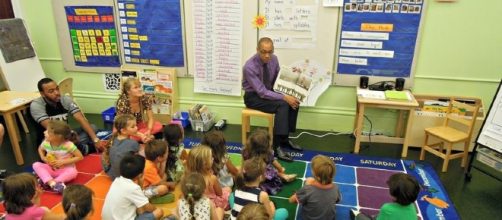Think back to many years ago, back when you were being sent off to school for the first time by yourself. For some, this was pre-school and for others, kindergarten. Either way, it was likely a frightening time, as you were being sent away from home-that safe place you had come to know and love-for anywhere from four to six hours every weekday. The good thing about it though, was that it was sort of like home in that you got to make arts and crafts, were read to, and even had nap time. Oh how many of us wish that little chunk of time was prescheduled into our days now, as it was back then.
Well, according to studies conducted by UC Berkley, that could change.
Current Kindergarten Environment
In today's American society, children begin their school life either in pre-school or kindergarten. It is their first time away from home without their parent or guardian to show them the way. Some take to this transition quite easily while others need time to adjust. Thanks to the current structure of free spirited Learning, where children are allowed to make arts and crafts, run around and make new friends, this transition is made just that little bit easier.
After the initial fear of being in a new environment with many people they have likely never met before-from the teacher, to potential aids and even other children-wears off, the once scary room suddenly becomes a happy, welcoming location where they are free to simply be themselves.
At this point in their lives, they don't have to worry about grades, as they don't even understand what those are. They may have heard the term before from an older sibling or television show, but at this point, they don't fully comprehend what it means, and how much effect it has on one's life. If the UC Berkley study gains traction however, that could change.
What the Study Says
According to the study, the reason this needs to change is because it is at this young age when childrens' minds are most easily molded. Results have demonstrated that children, especially those from low-income families, faired better with academic learning than their peers who remained at home until age 4.
The only problem with that is causes parents to put more pressure on their children to do better in school than did. As this continues, it ends up becoming a vicious cycle passed from parent to child, wherein the next has even more pressure to do better than the last until it reaches such a point where in the children cannot take it anymore.
Evaluating the Arguments
This is not to say that we shouldn't start teaching them basics such as letters, numbers, colors and the like as early as possible, simply that it should not be done in the same meticulous manner grade school is. Educational TV shows, games and toys are around for a reason.
When it comes to academic learning, there is a reason for the difference between pre-school/kindergarten and grades one and above.
The former are designed to be the way they are in order to slowly acclimatize children to the environment that is school, while the latter are designed to teach students more academic and practical knowledge. As such, there is no need to make it any more difficult than it already is by beginning this type of learning at so young an age. Do that, and children might be so scared of school and failure from a such a young age that they never want to go back.
Conclusion
While beginning academic learning as young as possible may be a good thing according to the study from UC Berkley, the thing it fails to take into account is that children will spend enough time behind a desk attempting to learn one subject or another.
Due to this, they don't need to start as early as possible. Let them have fun learning in a completely new environment, in their way before forcing them to learn in the same mundane way as everyone else for years on end.
For many, it will be their first time away from home without mom/dad or their guardian for for what will feel like an eternity. There is no need to make this experience any more difficult than necessary by throwing academic learning into the mix. Let kids be kids for as long as possible. Academic learning will come with time.


